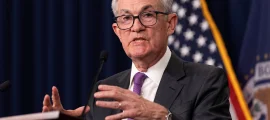News

Hyperinflation is an extreme form of inflation characterized by a rapid and uncontrollable increase in prices within an economy. It occurs when a country’s currency loses its value and purchasing power diminishes rapidly. Hyperinflation is typically caused by factors such as rapid money supply growth, economic crises, political instability, or economic imbalances. Hyperinflation is […]
“Hawkish” is a term used in economics and finance to describe a policy stance that favors tighter monetary policy or higher interest rates. It is often associated with central banks and their decisions regarding monetary policy. A Hawkish stance typically arises in response to specific economic indicators such as rising inflation, strong economic growth, […]
In financial markets, the term “Hawk” is commonly used to describe individuals or institutions that have a more aggressive or optimistic outlook on the market. Hawks are typically bullish investors who believe that the market will rise and take on higher risks in pursuit of potential higher returns. Hawks in financial markets often have […]
Hard Landing is a term used in economics and financial markets to describe a situation where the rate of economic growth slows down rapidly or even contracts. It typically occurs as a result of factors such as overheating, high inflation, excessive debt, or financial speculation in an economy. Hard Landing refers to a rapid […]
Forward guidance is a monetary policy tool used by central banks to communicate their future policy intentions and provide guidance to market participants. It involves the public announcement or communication of the central bank’s expected path of interest rates, economic conditions, or other policy measures over a certain time horizon. The main objective of […]
A forward contract is a customized agreement between two parties to buy or sell an asset at a specified price on a future date. This type of contract is often used to hedge against the risk of price fluctuations in financial markets. Forward contracts are traded over-the-counter (OTC), meaning they are not traded on centralized […]
In forex, a forward contract is an agreement between two parties to exchange a specified amount of currency at a predetermined future date and at an agreed-upon exchange rate. It is a type of derivative contract that allows market participants to hedge against or speculate on future currency price movements. Here are some key […]
The Federal Open Market Committee (FOMC) is a committee within the Federal Reserve System that is responsible for making decisions about monetary policy in the United States. The FOMC consists of 12 voting members, including the seven members of the Board of Governors of the Federal Reserve System and five of the 12 regional Federal […]
The Federal Open Market Committee (FOMC) is the monetary policy-making body of the Federal Reserve System, the central banking system of the United States. It is responsible for overseeing the nation’s open market operations and setting monetary policy to promote economic growth, price stability, and full employment. The FOMC is composed of twelve members, […]
A floating exchange rate, also known as a flexible exchange rate, is a type of exchange rate regime where the value of a country’s currency is determined by the foreign exchange market through supply and demand forces. In this system, the exchange rate fluctuates freely and is not fixed or pegged to any specific value […]
WhatsApp us
